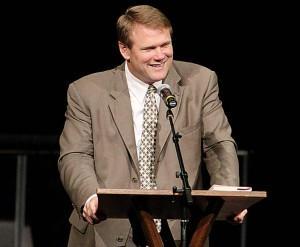Westmont Magazine Training Our Brains and Our Hearts to Overcome Envy
by Gayle D. Beebe, Ph.D., President
As humans, we face a tension between envy and contentment. We get preoccupied with comparing ourselves to others, which ruins how we celebrate and enjoy the gifts God has given us.
One of my favorite authors is Walker Percy. He trained to be a doctor but developed tuberculosis and was never able to practice medicine. He turned his considerable gifts to writing novels. The philosophy of Søren Kierkegaard, the father of existentialism, influenced Percy, who picked up the Kierkegaardian theme that the way we make choices fundamentally determines and reveals the kind of person we are and the life we’ll lead.
In one of Percy’s later novels,“Lost in the Cosmos,” he explores how people embody themselves. Percy shows us that we can become so preoccupied with who we want to be that we miss the greater meaning in life. He presents the proud self, the selfish self and the envious self, focusing on the latter. He raises the question: Why do we get greater joy from the misfortunes that happen to our archrival instead of our own accomplishments?
Evagrius of Pontus, a great thinker in the early church, identifies eight deadly thoughts (gluttony, anger, greed, envy, pride, lust, indifference and melancholy) that derail our life with God.They’re pivotal in helping us understand what goes on inside our mind and how that influences our behavior. How do we develop the spiritual energy to resist temptation and our self-centeredness to avoid patterns that ruin the life God intended for us?
Scripture describes envy’s disruptiveness:“A heart at peace gives life to the body, but envy rots the bones” (Proverbs 14:30). It also presents the alternative:“Love is patient, love is kind. Love is not envious or boastful or arrogant or rude. It does not insist on its own way, it is not irritable or resentful. It does not rejoice in wrongdoing, but rejoices in the truth” (1 Corinthians 13:4-6).
Envy destroys our capacity to live in community and get along well with others. It often gives rise to petty jealousy, gossip and an inability to celebrate the gifts that God has given to others.
Recent literature in neuroscience and psychology helps us understand how the eight deadly thoughts re-channel our brain. For example, research identifies two kinds of envy: inferiority and schadenfreude.We either feel inferior toward others and that sparks envy, or we find delight in the harm our archrival suffers. Evagrius noticed this trait in the fourth century and identified contentment as the way to overcome envy, build community and control our natural tendency to prefer ourselves to others.
The story of Cain and Abel in Genesis 4 illustrates envy. For some reason,Abel’s sacrifice pleased God, and Cain’s didn’t. Cain can’t control his disgust, and he murders Abel. Envy holds that kind of power: the capacity to destroy the gifts of others because we don’t feel accepted ourselves.
How do we cultivate contentment and overcome envy? We must begin with our own attitude and recognize that we can control our attitude and effort. Spiritual disciplines can help us reroute the natural inclination of our hearts.
Devoting ourselves to a life of prayer is important. We can think about people we deeply resent and begin to pray for them. Prayer will change us and the power these individuals hold over us.
In “How God Changes Your Brain,”Andrew Newberg explains the impact of prayer and spiritual disciplines. He writes,“You will have a more joyful, happier life if you believe in God and begin to live your life as if God exists.”This book isn’t explicitly Christian, but it makes a compelling case for the Christian life, which enhances our social awareness and compassion.
Being kind to people helps us realize the graciousness and mercy of God as we extend ourselves to others. Such acts strengthen the anterior cingulate in our brain, the connecting link between the limbic system and the frontal lobe, balancing reason and emotion so we can make reasonable responses to disruptive behaviors.
The single greatest problem adults face is our inability to regulate ourselves. We get in situations where we self-destruct. So another way to develop contentment is to learn to self-regulate.
I believe some people are inclined to be contented and others aren’t. But wherever we fall on this spectrum, we can learn to understand our life with God well enough to discipline disruptive moods, behaviors and tendencies, re-channeling them so they make a great contribution to our life.
Another important action is serving others, which cultivates the channels for developing empathy. I believe that one of the great needs of our culture is the capacity for empathy.
To cultivate contentment, we must build communities filled with love, communication, and sensory and intellectual stimulation. That’s what we seek to do at Westmont. Evagriusencouraged us to pursue contentment to overcome our inclination to envy, and neuroscience helps us understand that we’ll be healthier if we learn to re-channel destructive emotions. Thankfully, God provides the resources and guidance we need to accomplish this goal.
